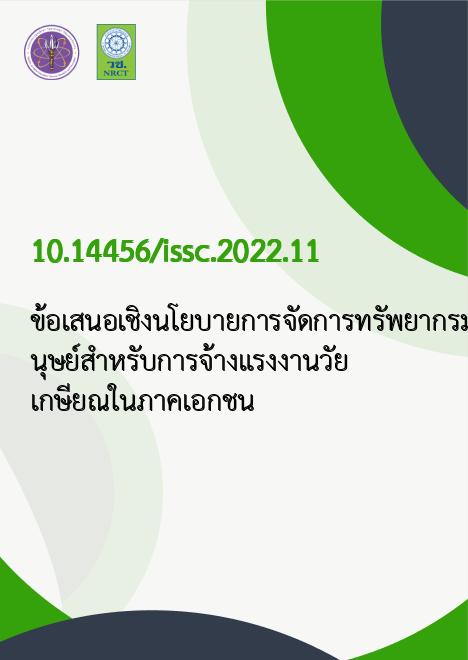
|
ข้อเสนอเชิงนโยบายการจัดการทรัพยากรมนุษย์สำหรับการจ้างแรงงานวัยเกษียณในภาคเอกชน |
|---|---|
| รหัสดีโอไอ | |
| Creator | วารุณี พูลสวัสดิ์ |
| Title | ข้อเสนอเชิงนโยบายการจัดการทรัพยากรมนุษย์สำหรับการจ้างแรงงานวัยเกษียณในภาคเอกชน |
| Contributor | เพ็ญศรี ฉิรินัง, อรุณ รักธรรม, ชาญ ธาระวาส |
| Publisher | คณะนิเทศศาสตร์ มหาวิทยาลัยราชภัฏรำไพพรรณี |
| Publication Year | 2565 |
| Journal Title | วารสารสหวิทยาการสังคมศาสตร์และการสื่อสาร |
| Journal Vol. | 5 |
| Journal No. | 3 |
| Page no. | 105-121 |
| Keyword | Human Resource Management, Employment, Retired Workers, Private Sector |
| URL Website | https://so02.tci-thaijo.org/index.php/ISSC/issue/view/17257 |
| Website title | https://so02.tci-thaijo.org/index.php/ISSC/issue/view/17257 |
| ISSN | ISSN 2630-0478 |
| Abstract | The objective of this research ware; 1) to analyze the opinion level of personal, job & organization, economic, motivation factors, and intention to continue working after retirement employees in a private company. 2) to examine personal, job & organization, economic, and motivational factors influence the willingness to continue working after retirement employees in a private company. 3) to offer a conclusion human resource management (HRM) policy to employ retired workers in the private sector. This research used mixed-method research. The sample group was private-sector employees in the quantitative section use multistage randomized sampling consisted of 396 people. The research tool was a questionnaire. Data were analyzed using descriptive statistics and study the relationship with path analysis statistical software. The sample group of qualitative research included executives in the private sector, employees in the private sector, and the public sector, using a purposive sampling method and providing eight people for in-depth interviews. The data analyzed by the inductive method. The results found that the opinion level of personal, jobs-organization, economic, and motivation were medium to high. Personal, jobs & organization, and economic factors, directly and indirectly, influence intention to work after retirement through motivation. The conclusion an HRM policy to employ retired workers in the private sector relying on the cooperation of three parts including employees, company & government in five issues: (1) planning (2) recruiting (3) development (4) motivation (5) compensation & benefits. |